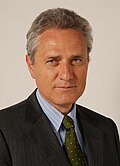| ||||||||||||||||||||||||||||||||||
All 47 Lombard seats in the Italian Senate | ||||||||||||||||||||||||||||||||||
|---|---|---|---|---|---|---|---|---|---|---|---|---|---|---|---|---|---|---|---|---|---|---|---|---|---|---|---|---|---|---|---|---|---|---|
| ||||||||||||||||||||||||||||||||||
| ||||||||||||||||||||||||||||||||||
Lombardy renewed its delegation to the Italian Senate on May 13, 2001. This election was a part of national Italian general election of 2001 even if, according to the Italian Constitution, every senatorial challenge in each Region is a single and independent race.
Contents
The election was won by the centre-right coalition called House of Freedoms, as it happened at the national level. The House was a new alliance formed for Lombard regional election of 2000 between political giants Pole of Freedoms and Lega Nord. All provinces gave a majority or a plurality to the new Prime Minister of Italy.

